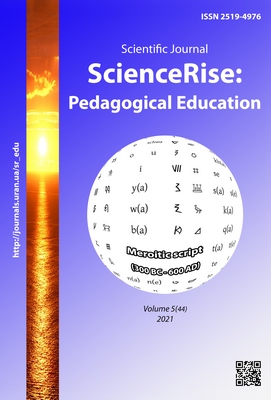ESP teacher professional development during the COVID-19 era
DOI:
https://doi.org/10.15587/2519-4984.2021.238556Keywords:
teacher professional development, English for Specific Purposes, webinar, online conference, the COVID-19 eraAbstract
This article analyses professional development, completed by 34 in-service ESP teachers of the Department of English for Engineering No. 1 at Igor Sikorsky KPI during March-December 2020. In total 3344.3 hours of professional teacher development were analysed. They were confirmed by certificates of attendance and completion. A significant rise in the number of hours ESP teachers of the Department of English for Engineering No. 1 at Igor Sikorsky KPI spend professionally developing was noticed compared to the years before the pandemic. Quantitative methods and statistical and mathematical processing were used to analyse the data. Nine main categories of professional development were outlined. ICT teacher skills (51.8 % hours), teaching approaches, methods and techniques (18.4 %), student and teacher assessment and evaluation (14.5 %) were distinguished as the three top categories of professional development during the COVID-19 era at the department. Together these categories embraced approximately 85 % of all time, spent on professional growth by ESP teachers of the Department of English for Engineering No. 1 at Igor Sikorsky KPI. Other six categories included: connections with other disciplines (6.6 %), academic publications and research issues (4.8 %), international teacher collaboration (2.1 %), student and teacher behavior problems (1.6 %), language issues (0.2 %), curriculum development (0.07 %). The results confirmed the high demand for learning new ICT tools, platforms, and Google services in March-December 2020, the high interest in teaching approaches, methods and techniques, which can be used during the COVID-19 era, and ways to assess and evaluate students’ and teacher’s performance. Webinars, online conferences and online courses turned out to be the most popular forms of professional development of ESP teachers at Igor Sikorsky KPI during March-December 2020. Another discovered trend was the variety of providers of trainings for ESP teachers during the COVID-19 era. The list of them included 37 different organisations, institutes and centers, such as Dinternal education, Training Center Linguist (Cambridge University Press), Educational project “Na urok”, The Ukrainian Institute of Information Technologies in Education, Oxford University Press, Macmillan Education and others
References
- Borg, S. (2019). The Impact of the English for Universities Project on ESP and EMI in Ukrainian Higher Education. British Council, 39. Available at: https://www.britishcouncil.org.ua/sites/default/files/efu_impact_report_.pdf
- OECD (2009). Creating Effective Teaching and Learning Environments: First Results from TALIS. Paris: OECD, 305. Available at: https://www.oecd.org/education/school/43023606.pdf
- Altan, M. (2016). The Need for More Effective In-service Training for Professional Development of English Language Teachers. British Journal of Education, Society & Behavioural Science, 15 (2), 1–12. doi: http://doi.org/10.9734/bjesbs/2016/24594
- Vo, L. T., Mai Nguyen, H. T. (2009). Critical Friends Group for EFL teacher professional development. ELT Journal, 64 (2), 205–213. doi: http://doi.org/10.1093/elt/ccp025
- Roliak, A. O., Semenyshyna, I. V. (2018). Continuous professional development of teachers: European context of Ukrainian transformations. Young Scientist, 6 (58), 338–341.
- Mizell, H. (2010). Why professional development matters. Learning Forward, 24. Available at: https://learningforward.org/wp-content/uploads/2017/08/professional-development-matters.pdf
- Bolam, R., Weindling, D. (2006). Synthesis of research and evaluation projects concerned with capacity-building through teachers’ professional development. London: General Teaching Council for England.
- Uysal, H. H. (2012). Evaluation of an In-service Training Program for Primary-school Language Teachers in Turkey. Australian Journal of Teacher Education, 37 (7), 14–29. doi: http://doi.org/10.14221/ajte.2012v37n7.4
- Nenko, Y. (2018). Professional development of English language teacher: some practical aspects. Mountain School of Ukrainian Carpaty, 19, 83–86. doi: http://doi.org/10.15330/msuc.2018.19.83-86
- Tips, resources and recommendations during COVID-19: Supporting educators’ wellbeing and professional development. Aga Khan development network. 9. Available at: https://d1zah1nkiby91r.cloudfront.net/s3fs-public/akdn_educators_back_to_school_tips_and_resources.pdf
- Reimers, M., Schleicher, A., Saavedra, J., Tuominen, S. (2020). Supporting the continuation of teaching and learning during the COVID-19 Pandemic. Global Education Innovation Initiative at the Harvard Graduate School of Education. OECD. The World Bank, HundrED, 37.
- Buendia, X. P., Macías, D. F. (2019). The Professional Development of English Language Teachers in Colombia: A Review of the Literature. Colombian Applied Linguistics Journal, 1 (21), 89–102. doi: http://doi.org/10.14483/22487085.12966
- Covacevich, C., Vargas, J. (2020). How might the coronavirus crisis be affecting foreign language teachers? Available at: https://oecdedutoday.com/coronavirus-foreign-language-teachers/
- Kyluk, E. V. (2020). Participation of Igor Sikorsky Kyiv Polytechnic Institute in the project "Academic Integrity and Quality Initiative". Available at: https://kpi.ua/en/2020-Academic-IQ
Downloads
Published
How to Cite
Issue
Section
License
Copyright (c) 2021 Yuliia Olizko, Nataliia Saienko

This work is licensed under a Creative Commons Attribution 4.0 International License.
Our journal abides by the Creative Commons CC BY copyright rights and permissions for open access journals.
Authors, who are published in this journal, agree to the following conditions:
1. The authors reserve the right to authorship of the work and pass the first publication right of this work to the journal under the terms of a Creative Commons CC BY, which allows others to freely distribute the published research with the obligatory reference to the authors of the original work and the first publication of the work in this journal.
2. The authors have the right to conclude separate supplement agreements that relate to non-exclusive work distribution in the form in which it has been published by the journal (for example, to upload the work to the online storage of the journal or publish it as part of a monograph), provided that the reference to the first publication of the work in this journal is included.







